 Petzlover
Petzlover Bichonpoo is originated from Australia but Kanni is originated from India. Bichonpoo may grow 32 cm / 12 inches shorter than Kanni. Bichonpoo may weigh 14 kg / 30 pounds lesser than Kanni. Both Bichonpoo and Kanni has almost same life span. Bichonpoo may have less litter size than Kanni. Bichonpoo requires High Maintenance. But Kanni requires Low Maintenance
Bichonpoo is originated from Australia but Kanni is originated from India. Bichonpoo may grow 32 cm / 12 inches shorter than Kanni. Bichonpoo may weigh 14 kg / 30 pounds lesser than Kanni. Both Bichonpoo and Kanni has almost same life span. Bichonpoo may have less litter size than Kanni. Bichonpoo requires High Maintenance. But Kanni requires Low Maintenance
 This popular little dog was developed by crossing the Poodle with the Bichon Frise to create the Bichonpoo. They are also called the Poochon and sometimes called the Birchpoo. They are a soft, curly breed and they are extremely cute – a very cuddly breed. They are not recognized by the AKC, CKC or the UKC. Some other kennel clubs do accept them and welcome them into obedience and agility trials. The breed was originally developed in Australia as a household pet for those who want a “curly lap dog” that was hypoallergenic, did not shed and had a great temperament for life in families with children. They were first developed in the latter part of the 20th century.
This popular little dog was developed by crossing the Poodle with the Bichon Frise to create the Bichonpoo. They are also called the Poochon and sometimes called the Birchpoo. They are a soft, curly breed and they are extremely cute – a very cuddly breed. They are not recognized by the AKC, CKC or the UKC. Some other kennel clubs do accept them and welcome them into obedience and agility trials. The breed was originally developed in Australia as a household pet for those who want a “curly lap dog” that was hypoallergenic, did not shed and had a great temperament for life in families with children. They were first developed in the latter part of the 20th century.
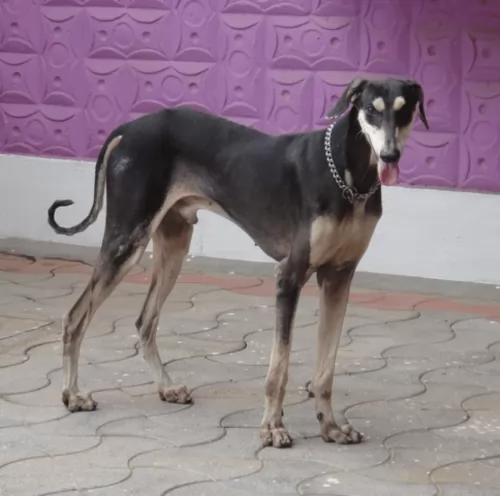 The Kanni dog is a rare South Indian Sighthound. It is also known as the Maiden's Beastmaster and this is because it is known to be protector and defender of its owner's property.
The Kanni dog is a rare South Indian Sighthound. It is also known as the Maiden's Beastmaster and this is because it is known to be protector and defender of its owner's property.
During ancient times, the dog was used for hunting but today it is essentially kept as a pet and it is registered with the Kennel Club of India.
 This Bichon Frise-Poodle cross is a small dog with big personality. The original hybrid is 50% Poodle and 50% Bichon Frise. This is considered a first-generation hybrid. The second-generation hybrid is 50% Bichonpoo and 50% purebred Bichon Frise or Poodle. Then third generation hybrids are a cross between two second generation dogs. There is no fourth generation and most breeders do not offer even a third generation. The original hybrid can be healthier than the parents, but any flaws tend to show up in 2nd generation hybrids and it gets worse with third generation. This dog should be hardy, well-proportioned and robust. They are small, sweet and sturdy. Because there are three different sizes of Poodles, there can be three different sizes of the Bichon Poo – Standard, Mini and Toy.
This Bichon Frise-Poodle cross is a small dog with big personality. The original hybrid is 50% Poodle and 50% Bichon Frise. This is considered a first-generation hybrid. The second-generation hybrid is 50% Bichonpoo and 50% purebred Bichon Frise or Poodle. Then third generation hybrids are a cross between two second generation dogs. There is no fourth generation and most breeders do not offer even a third generation. The original hybrid can be healthier than the parents, but any flaws tend to show up in 2nd generation hybrids and it gets worse with third generation. This dog should be hardy, well-proportioned and robust. They are small, sweet and sturdy. Because there are three different sizes of Poodles, there can be three different sizes of the Bichon Poo – Standard, Mini and Toy.
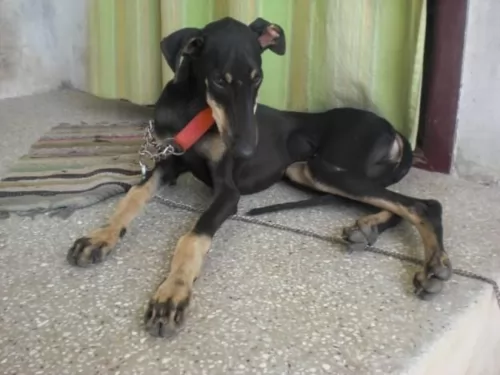 These dogs are tall, slim and deep chested, coming in two-color combinations, but it is the black and tan variety that is the true Kanni. There is also a cream variety. There are other color variations and each color has a unique name connected to it. The coat of the Kanni is short and smooth.
These dogs are tall, slim and deep chested, coming in two-color combinations, but it is the black and tan variety that is the true Kanni. There is also a cream variety. There are other color variations and each color has a unique name connected to it. The coat of the Kanni is short and smooth.
They are medium sized dogs standing at 62 to 67cm at the withers and weighing in the region of 18 – 22kg. When you first look at these dogs you might think of them as being similar to a Greyhound in looks. This is also because of their lean, muscular looks.
The eyes are a golden color, the nose black and the ears are a medium size and floppy with the long tail being semi-curved.
The Kanni has always been a hunting dog so he is used to being sharp, strong-willed, independent and alert as well as having some aggressive tendencies. It is also quite a reserved dog but he shows love and loyalty to his owner. He is independent and easy to train. It is a good thing to have him trained and socialized so that he is obedient to the simple commands you give him.
 The Bichonpoo is affectionate, intelligent and active just as you might expect from a Poodle/Bichon Frise cross. He loves people and lives well with other animals. He is particularly fond of children and loves to play with gentle older children. However, the temperament and characteristics of the hybrid are not as predictable as their parents. The characteristics of the Bichonpoo depends upon its lineage – if it is first generation, second generation or third generation. With each successive generation there is less predictability in the characteristics of the individual dog. Regardless of generation, the Bichonpoo will need exercise and mental stimulation. They are loving, good-natured and accommodating to their environment. They want to be with their owner and can get very attached.
The Bichonpoo is affectionate, intelligent and active just as you might expect from a Poodle/Bichon Frise cross. He loves people and lives well with other animals. He is particularly fond of children and loves to play with gentle older children. However, the temperament and characteristics of the hybrid are not as predictable as their parents. The characteristics of the Bichonpoo depends upon its lineage – if it is first generation, second generation or third generation. With each successive generation there is less predictability in the characteristics of the individual dog. Regardless of generation, the Bichonpoo will need exercise and mental stimulation. They are loving, good-natured and accommodating to their environment. They want to be with their owner and can get very attached.
Depending on their parents they can be anxious and high strung like the Poodle or nippiness and ‘small dog syndrome’ of the Bichon Frise. Separation anxiety can be a major issue with this breed. Do not let your Bichonpoo become dominate in your home or they will assume the alpha position and become very bossy, especially with children. He is easy to train and a good watchdog as well.
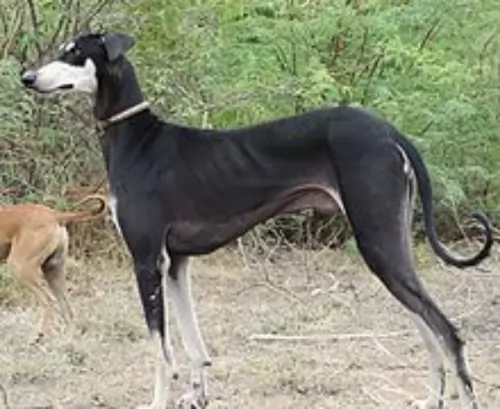 The Kanni looks much like your regular Doberman Pinscher but he has long tail and floppy ears. He is slim and agile but also powerful being able to have bursts of speed. It is why he requires a large place to run and play in, being better suited to a home with a large garden or farm.
The Kanni looks much like your regular Doberman Pinscher but he has long tail and floppy ears. He is slim and agile but also powerful being able to have bursts of speed. It is why he requires a large place to run and play in, being better suited to a home with a large garden or farm.
He is a playful, quiet dog but he has quite a bark on him and is known to be a good watchdog because of this. He is a protective dog too, devoted and loyal and making a splendid family pet.
 The Bichonpoo is usually healthier than either the Poodle or the Bichon Frise. At the same time, they could inherit any of health concerns of either of their parents in the first generation Bichonpoo. They are however likely to develop ear infections and skin allergies. Cleaning and grooming is essential, especially the ears, but also to prevent matting which could lead to skin infections.
The Bichonpoo is usually healthier than either the Poodle or the Bichon Frise. At the same time, they could inherit any of health concerns of either of their parents in the first generation Bichonpoo. They are however likely to develop ear infections and skin allergies. Cleaning and grooming is essential, especially the ears, but also to prevent matting which could lead to skin infections.
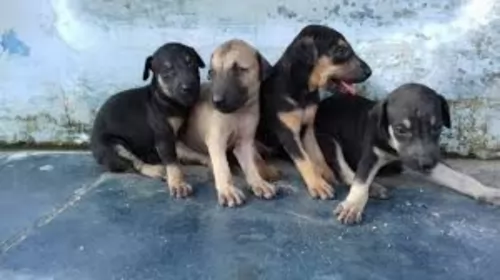 Not much is known about inherited health problems in this breed, and he can live up to a ripe old age of 16. It seems a pretty healthy dog, but still it helps to be aware of some of the more common dog illnesses that your pet can succumb to.
Not much is known about inherited health problems in this breed, and he can live up to a ripe old age of 16. It seems a pretty healthy dog, but still it helps to be aware of some of the more common dog illnesses that your pet can succumb to.
For first time dog owners it can be difficult knowing what health problems our beloved pets could suffer from. Every dog breed has certain diseases to which they are more prone to, but these are some common issues that most of our 4-legged friends will face -
This is a common dog health problem in India with the Kanni. There are so many things that disagree with their digestion. Most dogs may not want to eat their next meal, but when he is lethargic, he is hot and is vomiting, it is time to get your pet to the vet. This is because diarrhea causes rapid dehydration in dogs. To avoid diarrhea, steer clear of certain foods such as milk and dairy products as well as old, spoiled fatty foods. With diarrhea your dog must always have access to fresh, cool water.
This is a common dog disease, and ear infections can be painful and frustrating for your pet. He’ll scratch at his ear, shake his head and the inside of the ear may be red with a discharge. Check his ears for redness and try to keep them free from wax build up and dust.
Cleaning the ear is quite simple, and if you’re not sure how, the vet can do it quickly and effectively. Usually some dog ear cleaning solution on some cotton wool can do the trick. Ear infections are common in dogs like the Kanni with floppy ears.
It is essential to control fleas on your dog from word go. Fleas thrive in warm temperature and humidity and your pet will scratch, bite and lick at the spot. When you brush your pet, look through his fur for fleas and tell you vet about it if you discover ticks and fleas. A topical ointment could nip the problem in the bud. You may want to consider a flea collar for your pet.
Tapeworms, hookworms and roundworms for instance are commonly found in dogs, and even for healthy dogs, deworming tablets should be given from time to time. If your dog has worms, you’ll notice lethargy, loss of appetite, diarrhea and vomiting. It may be time to get your pet to the vet.
 The Bichonpoo is an energetic little dog and needs enough nutrition to keep up with his needs. Feed a Bichonpoo at least twice a day – small meals- and dry food because of dental issues. A high-quality food will help to prevent allegories.
The Bichonpoo is an energetic little dog and needs enough nutrition to keep up with his needs. Feed a Bichonpoo at least twice a day – small meals- and dry food because of dental issues. A high-quality food will help to prevent allegories.
The Bichonpoo is the product of the poodle who is prone to bloat and Addison’s Disease and the Bichon Frise who is susceptible to Patella luxation, progressive retinal atrophy and liver shunts. The first generation Bichonpoo should be free of these health concerns. You should be aware that there is a possibility that the first-generation hybrid could contract any of its parents’ illnesses or deficiencies.
This hybrid is a high energy dog and needs daily exercise in the form of walks and play. They have the intelligence and skill of the Poodle with the energetic desire to play of the Bichon Frise. They need toys and a person to play with. She will need to be both mentally and physically stimulated. If she gets bored she will become destructive and noisy with barks and whines.
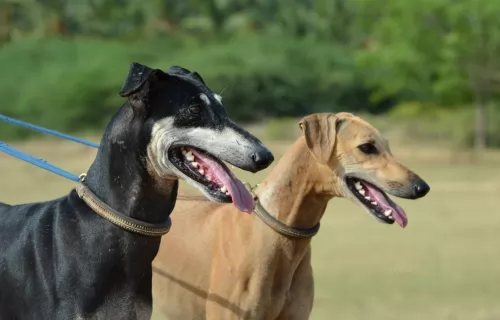 The Kanni is a low maintenance dog with his short coat. You can give him a good brush twice a week, check that his nails don't grow too long and also check his ears inside and out. Ticks and fleas are rife in hot weather and you want to give your dog a thorough check for these. You should also be checking your dog's teeth and brushing them 2 or 3 times a week. Dental problems can cause havoc with your dog's health.
The Kanni is a low maintenance dog with his short coat. You can give him a good brush twice a week, check that his nails don't grow too long and also check his ears inside and out. Ticks and fleas are rife in hot weather and you want to give your dog a thorough check for these. You should also be checking your dog's teeth and brushing them 2 or 3 times a week. Dental problems can cause havoc with your dog's health.
As a hunting breed, the Kanni is used to running so his needs for a good amount of exercise are quite high. While they do make good family pets, they hanker after wide open spaces and being busy. If you own one of these dogs, make sure that you exercise him often because otherwise he becomes frustrated and unhappy.
This dog has always been used to village life where he is free to roam wide open spaces. He is much more suited to country life than to city life, and as a pet, you will need to ensure that he receives a good amount of exercise.
Take him for walks, and if he's been socialized and trained, take him to the park and allow him off his leash to run.
The dog has always been fed traditional food such as porridge and milk but we know better now that dogs need protein too as well as a diet rich in vitamins and minerals to ensure his health.
You can feed him a top quality commercially manufactured dog food and add in some cooked chicken, rice and vegetables from time to time. It is expensive, but if you can, try and add in some raw meat occasionally as well. Your Kanni dog must always have access to fresh, clean water.